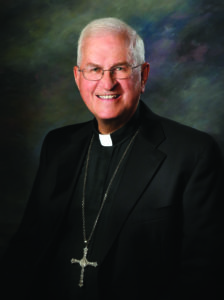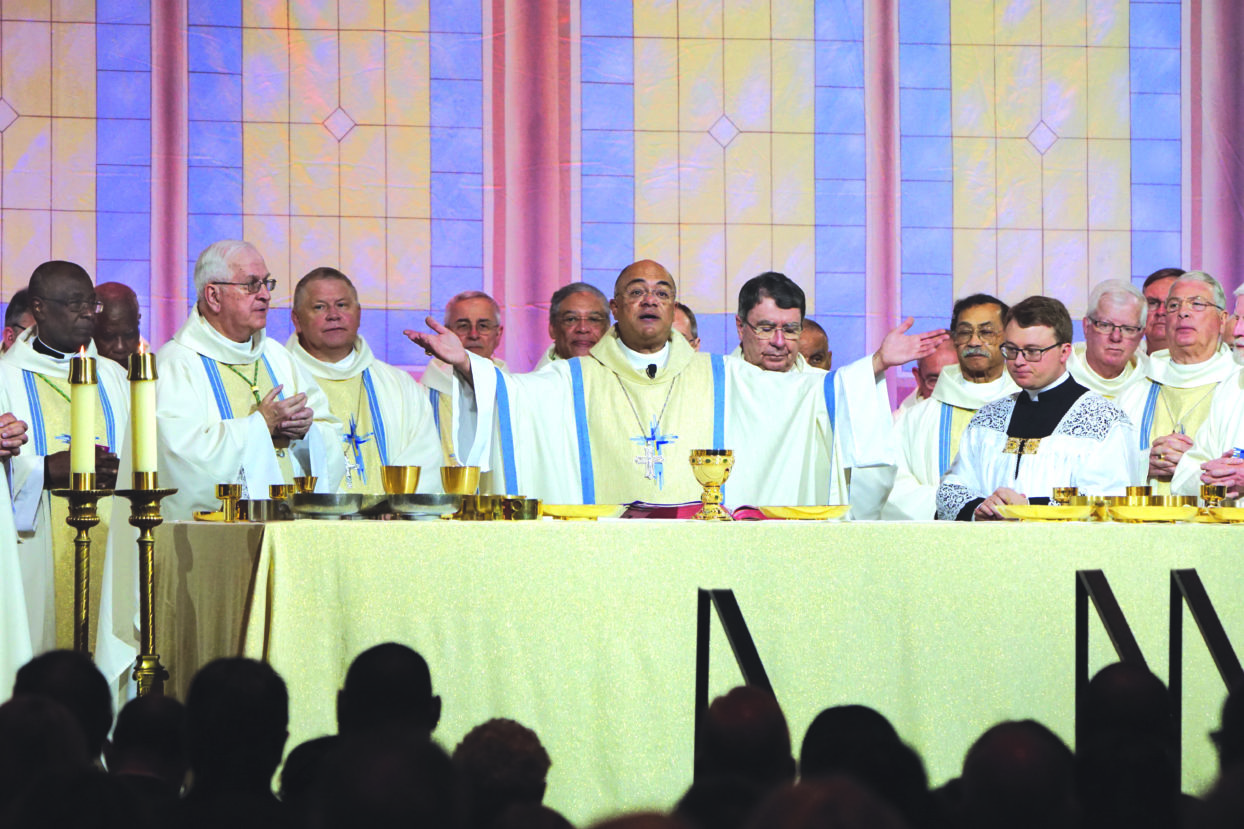Archdiocese of Louisville’s fifth shepherd welcomed as new leader, successor to Archbishop Kurtz
By Marnie McAllister
The Record
Nearly 3,000 people of the Archdiocese of Louisville, including hundreds of clergy and religious, welcomed their new shepherd, Archbishop Shelton Joseph Fabre, as he became the 10th bishop and fifth archbishop to lead the historic region of central Kentucky.
He succeeds Archbishop Emeritus Joseph E. Kurtz, who has served as Archbishop of Louisville since 2007.
Archbishop Fabre also will serve as leader of the Louisville Province, which includes the Diocese of Knoxville.
The Mass of Installation, celebrated at the Kentucky International Convention Center in downtown Louisville, began with a reading of the apostolic mandate by the papal nuncio, Archbishop Christophe Pierre. The nuncio brought laughter to the ceremony by noting the difficulty of pronouncing Louisville correctly, along with other areas where Archbishop Fabre has served — New Orleans, Baton Rouge, and the Diocese of Houma-Thibodaux.
More seriously, he told the congregation and those watching the live stream that “A new era begins.”
He offered gratitude for the service of Archbishop Kurtz, for his time as Bishop of Knoxville, his service in the Archdiocese of Louisville, and as a national leader in the U.S. Conference of Catholic Bishops.
“Thank you for decades of dedicated service,” Archbishop Pierre told Archbishop Kurtz.
To Archbishop Fabre, he said, “You have big shoes to fill.”
He encouraged the new archbishop to be close to the people of God and went on to quote part of Pope Francis’ opening speech from the International Conference on the Priesthood Feb. 17.
“Closeness to the People of God, a closeness that, enriched by those other forms of closeness, invites and indeed demands that we imitate the Lord’s own ‘style,’” the nuncio quoted.
“That style is one of closeness, compassion, and tenderness, in which we act not as judges, but as Good Samaritans who acknowledge the wounds of our people, their silent sufferings, the self-denial and sacrifices made by so many fathers and mothers to support their families. Who acknowledge, too, the effects of violence, corruption, and indifference that, in their wake, seek to stifle all hope.
“A style of closeness that allows us to pour balm upon wounds and to proclaim a year of favor from the Lord. It is imperative to remember that the people of God are hoping to find shepherds in the style of Jesus.”
Archbishop Pierre concluded by invoking the intercession of St. Joseph and the Blessed Mother.
Following his speech, the nuncio presented the mandate to Archbishop Fabre, who showed it to the priests, bishops, and cardinals on the platform that served as the sanctuary and then stepped into the congregation to share it with the assembly.
His formal installation concluded as Archbishop Kurtz and the nuncio guided him to the bishop’s chair—the cathedra—where he received his crozier, a staff of polished wood.
During his homily, Archbishop Fabre picked up the nuncio’s joke and pronounced Louisville — Lou-ah-vul — with a laugh, saying, “I practiced and I got it! … May all problems be so easily solved.”
He went on to highlight a theme he also underscored the night before at vespers: unity in Jesus Christ.
He asked the congregation to keep “our eyes focused on him; focused on the things that unite us instead of the things that divide us.”
He was answered with applause. He added that the Archdiocese of Louisville is “rich in cultural diversity” and asked that people stand together “because we are in this together.”
His message was reflected in the day’s prayer and music, which spanned cultures, languages, and time periods. Languages included were Vietnamese, French Creole, Tagalog, Korean, German, Malayalam (a language spoken in southwestern India), Swahili, and Spanish.
Following Mass, hundreds of people lined up to welcome the new archbishop. He received well-wishers for about two hours in the lobby of the convention center.

Archbishop Joseph E. Kurtz of Louisville, Ky., is pictured in an Aug. 8, 2018, photo. (CNS photo/courtesy Archdiocese of Louisville)
Archbishop Fabre’s installation was 12 days after Archbishop Kurtz, who is 75, celebrated his 50th year of priesthood.
His golden jubilee was marked with a Mass at the Cathedral of the Assumption on March 18. The Mass included a procession of nearly 25 deacons and more than 60 priests, and was followed by a luncheon.
“There’s never been a day I’ve served as a priest or bishop that I’ve had anything but gratitude for my vocation,” Archbishop Kurtz said.
The retiring archbishop told the congregation that he recently received a letter that was written in Latin from Pope Francis. Archbishop Kurtz said laughing that he wondered whether the letter would include a new assignment.
While the Holy Father’s letter did not include a new assignment, it did laud Archbishop Kurtz for his ministry of nearly 15 years as an archbishop as well as his service to the U.S. Conference of Catholic Bishops.
“It’s a great honor for him (Pope Francis) to remember and respect the work not only you and I are doing, but also the work that the conference is doing,” Archbishop Kurtz said.
The letter, Archbishop Kurtz said, was a good reminder to be as generous as we can be but also that “we’re given permission to be humble servants who are not perfect.”
He said that when he began seminary he was challenged to choose a particular fault of his and work to turn a vice into a virtue.
In his fourth year of theology, he admitted he was still working on the fault he picked: impatience.
Archbishop Kurtz closed his anniversary Mass by calling on the congregation to pray for a vibrant and good Church that is vibrant in Jesus Christ “that we may speak where necessary with bold courage, … and humility to know God’s in charge.”


Comments 1
I wish Archbishop Kurtz many blessings in his retirement. When Archbishop Kurtz was assigned as the first Bishop of the Knoxville Tennessee Diocese, I was a prisoner at Morgan County Correctional Complex and I wrote a letter to him welcoming him to Knoxville and inviting him to visit the prison there in “. . .Wartburg, the Lutheran stronghold of East Tennessee.” Imagine my surprise when he took the time, not only to write back, but when he actually came to visit! We corresponded a few times after that and I have been quietly following his career ever since. I know he will be missed by all those he worked with.